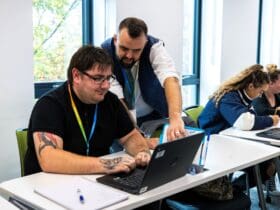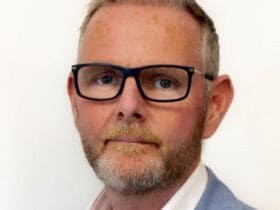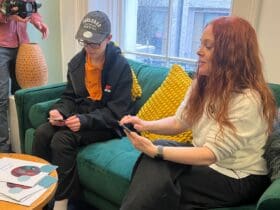Earlier this week (Tuesday, December 3rd) , the University of Wales Trinity Saint David (UWTSD) celebrated the achievements of its BA Early Years Education and Care (Early Years Practitioner Status) students as they graduated from an innovative two-year degree course.
Having following a condensed fast-track programme, the students gained a full BA (Hons) degree in only two years and graduated with Early Years Practitioner Status – an award which is recognised on the list of qualifications to work in the Early Years sector by Social Care Wales. Those graduating this week studied at either the University’s campus in Carmarthen or at UWTSD’s new SA1 Waterfront Development in Swansea. The ceremony was held at UWTSD’s Carmarthen campus.
This particular degree has been designed to allow parents with young children and families the opportunity to study. Lectures usually take place one evening a week and on some Saturdays allowing students to maintain other work commitments. Delivered in a supportive, engaging environment, the course explores all aspects of children’s well-being and holistic development. Students are supported to become confident graduates with the professional competence to develop as effective practitioners.
Since graduating, many students have already embarked on exciting opportunities including gaining places on Postgraduate Certificate in Education (PGCE) courses enabling them to pursue careers as primary school teachers; progressing to postgraduate study or continuing to progress in their chosen careers.
“I decided to study the course to improve my knowledge of child care as I have worked as a NNEB and Teaching Assistant for 27 years,” says Tracy Leahy from Peniel, Carmarthenshire who graduated yesterday with a first class BA honours degree in Early Years Education and Care (Early Years Practitioner Status).
“Education is my passion and I have always longed to make a difference in a child’s education. I knew this would be a challenge for me and was quite anxious as I didn’t know what to expect – I hadn’t had any formal education since my NNEB course. I found the Early Years staff were very supportive and extremely knowledgeable,” continues Tracy.
“The Early Years Education and Care course has given me a more in depth knowledge of child care and development. As soon as I started the course in September 2017 I applied everything I learnt in lectures and assignments to my job and had lengthy discussions with colleagues about how to improve a children’s learning environment in school.
“I’ve really enjoyed my time at University,” enthuses Tracy. “The course was very intense due to it being condensed from three to two years however I couldn’t have done it as a full-time degree due to work commitments – and that’s where the flexibility of doing it in the evening has been a tremendous benefit.
“It’s been quite the juggling act between work, three children and family commitments, including looking after my elderly father but I do feel strongly that whatever your age, circumstances or background, three shouldn’t be any barriers to achieving a degree or aiming even higher.”
Natalie Macdonald, Programme Director of the BA Early Years Education and Care (Early Years Practitioner Status) programme at UWTSD is extremely proud of the graduates and thoroughly enjoyed marking their success during last night’s graduation ceremony.
“We are exceptionally proud of our two-year fast track flexible learning degree programme and students in Early Years,” says Natalie. “This type of degree programme offers a unique opportunity for people who would usually rule out studying for a degree, the chance to study whilst also continuing to work. The evening delivery and block teaching approach creates a programme tailored to suit the needs of those already working with children to open up their career prospects and achieve something many of our students did not think possible.
“The success of the fast track programme has led to the team to develop provision in Cardiff, as well as Carmarthen and Swansea, and is part of the Childhood and Education disciplines’ commitment to supporting flexible provision and widening access to higher education,” adds Natalie.








Leave a Reply
View Comments